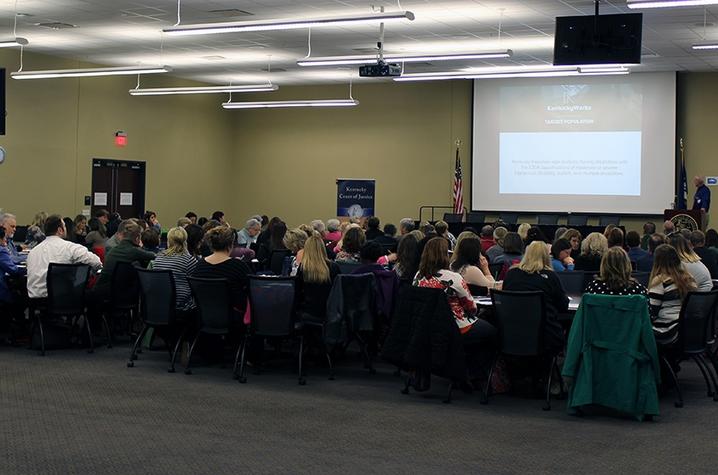UK HDI Joins Community to Share Ideas About Employment for Youth with Disabilities

LEXINGTON, Ky. (March 14, 2017) — More than 150 participants made up of educators, parents and students, service providers, and agency liaisons, including the University of Kentucky Human Development Institute (HDI), recently met to discuss how to improve job outcomes for students with disabilities transitioning from school to the workforce.
The Inaugural KentuckyWorks Transition Summit and Community Conversation took place Feb. 28 in Frankfort. Representatives from across the state packed into the large conference room at the Administrative Office of the Courts Building to begin a dialogue as to how to support Kentucky students with the most significant disabilities take their role in the workplace or in continuing education.
The morning session was intended to help participants gather information about current services and programs available for students with disabilities. Former UK HDI Director Harold Kleinert kicked off the morning session by introducing the KentuckyWorks project and setting the tone for the rest of the summit.
Two panels of service providers followed, highlighting programs across the state and allowing attendees to ask questions as to the effectiveness of each on students. The following programs were represented: Community Work Transition Project; College and Career Readiness; OVR Dual Enrollment/SHEP; Adult Focused Projects; OVR/WIOA Initiatives; OFB/ WIOA Initiatives; and Supported Employment Training Project.
Perhaps the highlight of the day was the youth panel. Three individuals, all at different levels in the transition process, shared their experiences and aspirations for the future. Tennessee transition expert Erik Carter rounded out the morning by introducing the method behind the community conversation approach to gathering ideas and by setting the format for the afternoon session.
After lunch, participants were divided into groups of six to eight per table for the community conversation. The first question was to talk about what is currently working for transition students in Kentucky. After 20 minutes, each group switched gears to discuss what is not working. Finally, everyone rotated to other tables and discussed ideas for improving services and how to increase the percentage of students with intellectual disabilities successfully employed after leaving secondary education programs. The entire group came back together at the end for the “harvesting of the best ideas.”
The KentuckyWorks staff is currently analyzing the narratives collected during the summit in order to drive program development in the future. It is the intention of the promoters of the event to have another summit in 2018.




